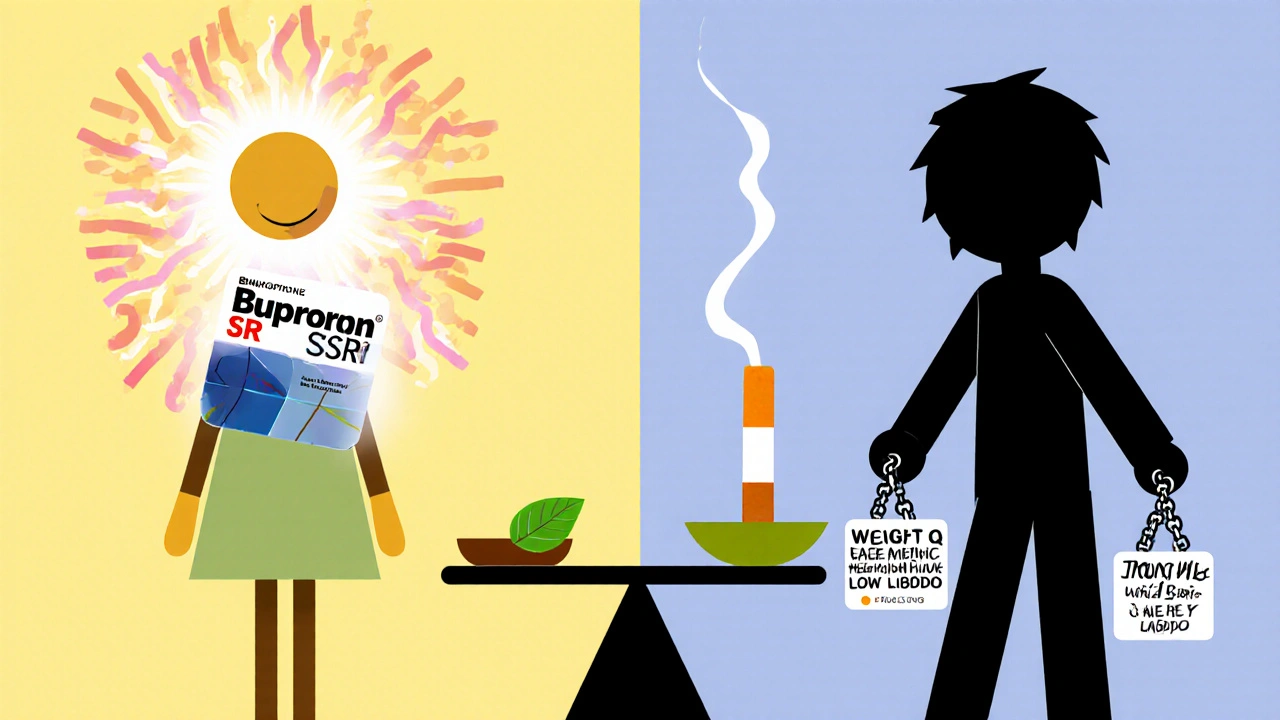 18
Nov,2025
18
Nov,2025
Medication Matchmaker: Find Your Best Antidepressant
Find Your Best Antidepressant Match
Answer a few questions about your symptoms and side effect concerns to see which medication might work best for you.
Recommendation Results
Select your symptoms and concerns to see your personalized recommendation.
Bupron SR is a brand name for bupropion, a medication used mainly to treat depression and help people quit smoking. It works differently than most other antidepressants. While SSRIs like sertraline or escitalopram boost serotonin, bupropion targets dopamine and norepinephrine. This makes it a go-to option for people who don’t respond well to SSRIs or experience side effects like sexual dysfunction or weight gain. But it’s not the only choice. If you’re on Bupron SR or considering it, you should know what else is out there-and how they stack up.
How Bupron SR Works and Who It’s For
Bupropion, sold as Bupron SR in Australia, is an atypical antidepressant. It doesn’t affect serotonin levels much, which is why it’s often chosen when SSRIs cause low libido, emotional numbness, or weight gain. It’s also approved under the name Zyban for smoking cessation. The sustained-release (SR) version gives steady levels over 12 hours, meaning you take it twice daily. People often notice improvements in energy and motivation within two to four weeks.
It’s commonly prescribed for major depressive disorder, seasonal affective disorder, and nicotine dependence. Some doctors use it off-label for ADHD or antidepressant-induced sexual side effects. But it’s not for everyone. If you have a seizure disorder, an eating disorder like anorexia, or are abruptly stopping alcohol or benzodiazepines, bupropion can increase seizure risk.
Wellbutrin: The Same Drug, Different Brand
Wellbutrin is the original brand name for bupropion in the U.S., but in Australia, Bupron SR is the most common brand. They contain the exact same active ingredient: bupropion hydrochloride. The difference is in the manufacturer, packaging, and price. Generic bupropion SR is widely available here and costs significantly less. If you’re paying full price for Bupron SR, ask your pharmacist about switching to a generic version. You’ll get the same effect for up to 70% less.
Some people notice small differences in how their body reacts to different brands-maybe due to inactive ingredients or release timing. If you switch and feel worse, go back to the original. But for most, generic bupropion SR works just as well.
SSRIs: The Most Common Alternatives
SSRIs like sertraline (Zoloft), escitalopram (Lexapro), and fluoxetine (Prozac) are the first-line treatment for depression in most guidelines. They’re effective, safe for long-term use, and have lots of real-world data backing them. But they come with trade-offs.
Compared to bupropion:
- SSRIs are more likely to cause weight gain-about 5-10% of users gain 7+ pounds in the first year.
- Sexual side effects (low desire, delayed orgasm) affect up to 60% of people on SSRIs.
- Bupropion is less likely to cause drowsiness, while SSRIs often do.
- SSRIs have a lower seizure risk than bupropion.
If you’re struggling with low energy or lack of motivation, bupropion might be better. If you’re dealing with anxiety alongside depression, SSRIs often win. A 2023 meta-analysis in The Lancet Psychiatry found that while SSRIs had higher overall response rates, bupropion was better tolerated in people who couldn’t handle sexual side effects.
SNRIs: A Middle Ground
SNRIs like venlafaxine (Effexor) and duloxetine (Cymbalta) boost both serotonin and norepinephrine. They’re stronger than SSRIs for some types of depression, especially when physical pain or fatigue is involved.
Compared to Bupron SR:
- SNRIs may help more with chronic pain or fibromyalgia-bupropion doesn’t.
- SNRIs can raise blood pressure, especially at higher doses. Bupropion doesn’t typically affect BP.
- Both can cause nausea, but SNRIs often cause more of it early on.
- SNRIs have a higher risk of withdrawal symptoms if stopped suddenly.
People who tried SSRIs and still felt tired or unmotivated often find SNRIs helpful. But if you’ve had trouble with sexual side effects or weight gain on SSRIs, SNRIs might not be much better. Bupropion still wins on that front.
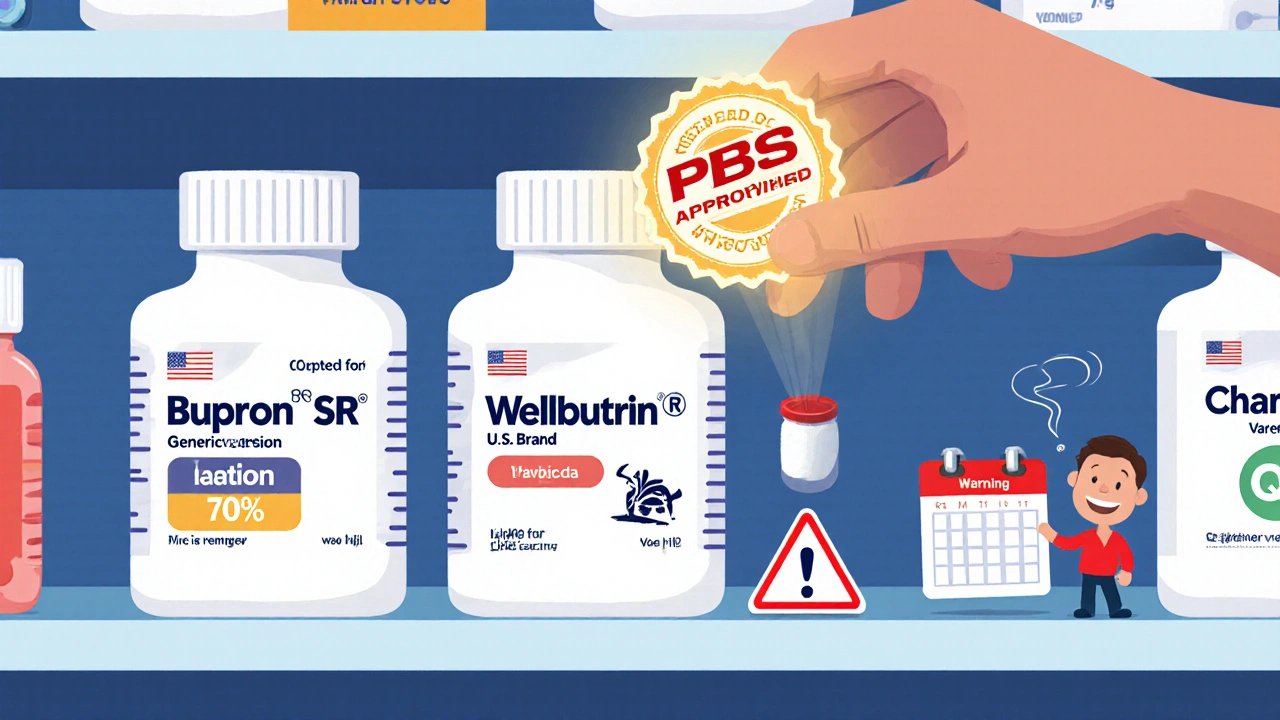
Other Antidepressants: Vilazodone, Vortioxetine, Mirtazapine
These are less common but worth knowing about if standard options haven’t worked.
Vilazodone (Viibryd) combines SSRI action with partial serotonin receptor activation. It’s less likely to cause weight gain than other SSRIs but still causes nausea and sexual side effects.
Vortioxetine (Trintellix) works on multiple serotonin receptors. It’s marketed as improving thinking and focus in depression. Some patients report better concentration than with bupropion, but it’s more expensive and not always covered by PBS.
Mirtazapine (Remeron) is sedating and increases appetite. It’s great for people with insomnia and poor appetite, but it often leads to weight gain-sometimes 10+ kg in six months. If you’re trying to quit smoking, mirtazapine isn’t a good fit. Bupropion is.
Smoking Cessation: Zyban vs. Other Quit Aids
Bupropion SR is sold as Zyban for quitting smoking. It reduces cravings and withdrawal symptoms. Studies show it doubles your chances of quitting compared to placebo.
But it’s not the only option:
- Nicotine replacement therapy (NRT) - patches, gum, lozenges. Safe, effective, and can be used with bupropion.
- Varenicline (Champix) - more effective than bupropion, but has a black box warning for mood changes and suicidal thoughts. Not for people with severe depression.
- SSRIs - not approved for smoking cessation. Studies show they don’t help much.
- Counselling + medication - combining any of these with free Quitline support increases success rates by 30-50%.
If you’re trying to quit smoking and have depression, bupropion is a strong dual-purpose choice. If you’re only trying to quit and don’t have depression, varenicline may work better-but only if your mental health is stable.
What About Natural Options?
St. John’s Wort is sometimes used for mild depression. It works similarly to SSRIs by increasing serotonin. But it interacts dangerously with many drugs-including bupropion. It can cause serotonin syndrome, a rare but life-threatening condition.
Omega-3s, vitamin D, and exercise help with mood, but they’re not replacements for medication in moderate to severe depression. Don’t swap your prescription for supplements without talking to your doctor.
Choosing the Right Option for You
There’s no one-size-fits-all. Here’s how to decide:
- If you have low energy, lack of motivation, or sexual side effects from another antidepressant → Bupron SR is a top pick.
- If you have anxiety, panic attacks, or OCD → SSRIs or SNRIs are better.
- If you’re trying to quit smoking and have depression → Bupron SR is ideal.
- If you have chronic pain or fatigue → SNRIs may be more helpful.
- If you struggle with sleep and appetite → Mirtazapine might help, but watch weight gain.
- If you’re on other meds or have a history of seizures → Avoid bupropion.
Most people try one or two options before finding the right fit. It’s not failure-it’s part of the process. Your doctor can help you switch safely. Never stop abruptly.
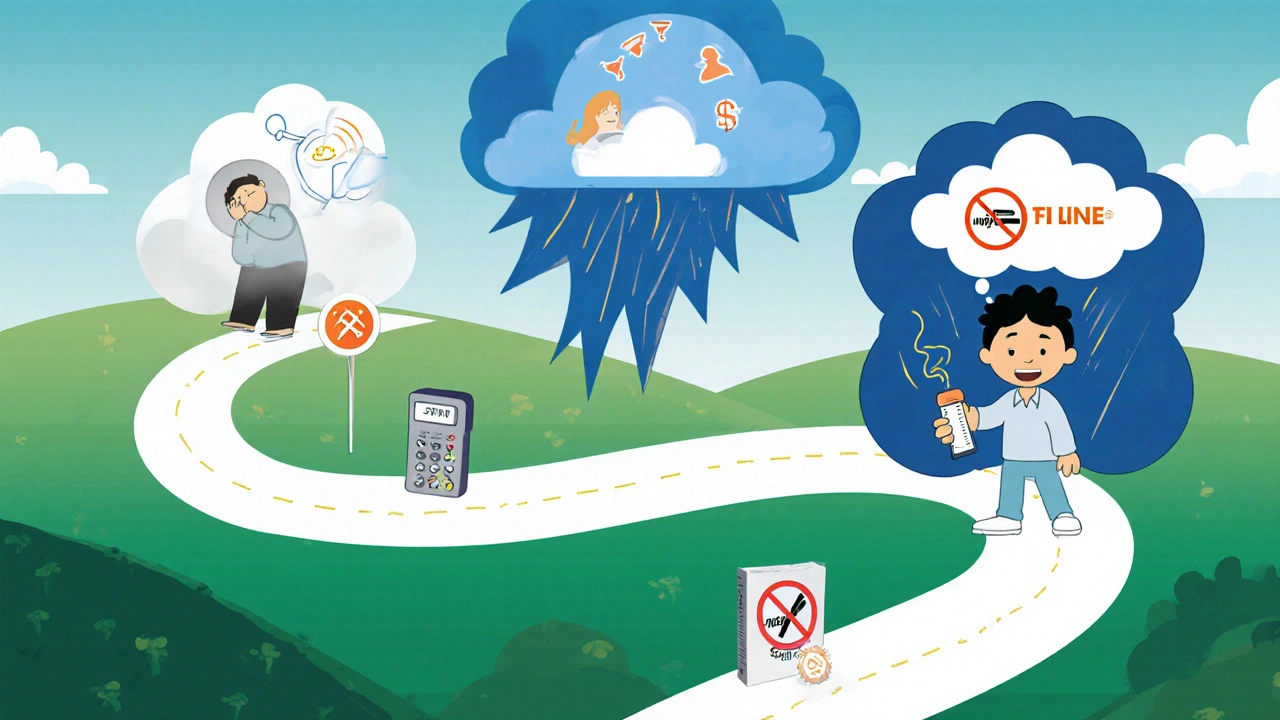
Side Effects to Watch For
Bupron SR is generally well-tolerated, but common side effects include:
- Dry mouth (up to 30% of users)
- Insomnia (especially if taken late in the day)
- Headaches
- Increased sweating
- Nausea
Less common but serious:
- Seizures (risk is 0.1% at 300mg/day, higher with overdose or certain conditions)
- Increased anxiety or agitation (especially early on)
- Manic episodes in people with bipolar disorder
SSRIs and SNRIs have higher rates of nausea and sexual side effects. Varenicline can cause vivid dreams or mood changes. Know your risks.
Cost and Accessibility in Australia
Bupron SR is listed on the PBS. With a prescription, you pay the standard co-payment-around $31.30 for general patients, or $7.70 with a concession card. Generic bupropion SR costs the same. Wellbutrin XL (extended-release) is not available in Australia.
Varenicline (Champix) is also PBS-listed. It’s more expensive per pill than bupropion but may be more effective for quitting smoking. SSRIs like sertraline and escitalopram are cheap generics-often under $10 per month.
Insurance doesn’t cover St. John’s Wort or supplements. Stick to PBS-approved meds unless your doctor advises otherwise.
What to Do Next
If you’re on Bupron SR and it’s working-keep going. If you’re having side effects or it’s not helping, talk to your doctor. Don’t switch on your own. If you’re not on it yet and want to try something new, ask about:
- Generic bupropion SR (it’s just as good)
- SSRIs if anxiety is a big part of your depression
- Varenicline if you’re focused on quitting smoking and have no history of mood disorders
- Combining medication with counselling or Quitline (13 7848)
Antidepressants aren’t magic pills. They’re tools. The right one helps you feel like yourself again. The goal isn’t to find the ‘best’ drug-it’s to find the one that fits your life, your body, and your goals.
Is Bupron SR the same as Wellbutrin?
Yes. Bupron SR and Wellbutrin both contain bupropion hydrochloride as the active ingredient. The difference is the brand name and manufacturer. In Australia, Bupron SR is the common brand, while Wellbutrin is used in the U.S. Generic versions of bupropion SR are available and cost significantly less, with the same effectiveness.
Can I take Bupron SR with other antidepressants?
Combining bupropion with SSRIs or SNRIs is sometimes done under medical supervision, especially if one drug alone isn’t enough. This is called augmentation. But it increases the risk of seizures and serotonin syndrome. Never combine them without your doctor’s approval and close monitoring.
Does Bupron SR cause weight gain?
Unlike most antidepressants, bupropion is often associated with weight loss or no change in weight. Studies show up to 20% of users lose a small amount of weight (2-5 kg) in the first few months. It’s one reason it’s preferred for people worried about gaining weight on other meds.
How long does it take for Bupron SR to work for smoking cessation?
You should start taking Bupron SR 1-2 weeks before your quit date. It builds up in your system to reduce cravings and withdrawal symptoms. Most people notice reduced urges to smoke within 7-10 days. The full effect usually takes 3-4 weeks. It’s typically taken for 7-12 weeks, but some stay on longer with their doctor’s advice.
Is bupropion safe for long-term use?
Yes. Bupropion has been used safely for decades in both depression and smoking cessation. Long-term studies show no increased risk of organ damage or cognitive decline. The main concerns remain seizure risk (especially with high doses or certain medical conditions) and potential for mood changes. Regular check-ins with your doctor help manage these risks.
What’s the best alternative to Bupron SR for depression with low energy?
For depression with low energy and fatigue, bupropion is often the top choice. If it doesn’t work or isn’t suitable, SNRIs like venlafaxine or duloxetine are the next best options. They also boost norepinephrine, which helps with energy and motivation. Vortioxetine is another option with evidence for improving mental processing speed in depression.
Final Thoughts
There’s no perfect antidepressant. What works for one person might not work for another. Bupron SR stands out because it doesn’t cause sexual side effects or weight gain-and it helps with quitting smoking. But it’s not the only tool. SSRIs, SNRIs, and varenicline each have their place. The key is matching the medication to your symptoms, lifestyle, and goals-not just following the most popular option.
Work with your doctor. Track how you feel. Give each option time. And remember: finding the right treatment is a journey, not a single decision.

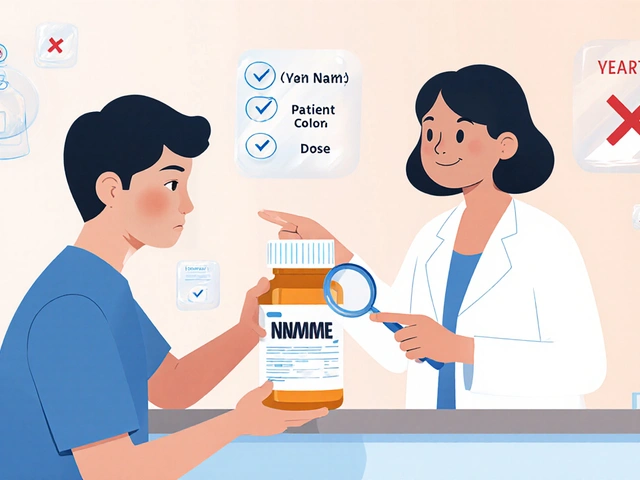
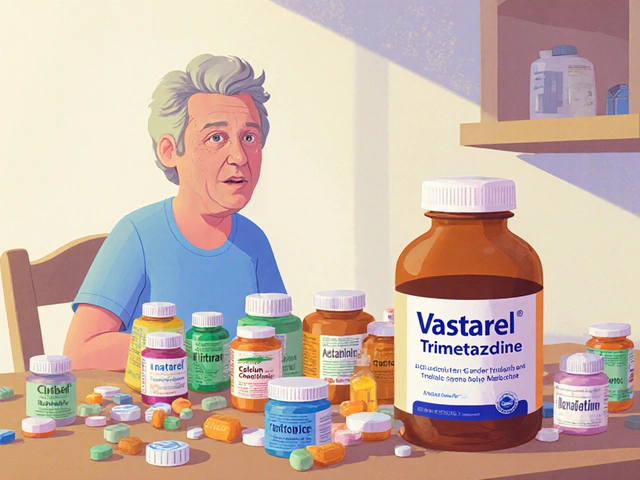
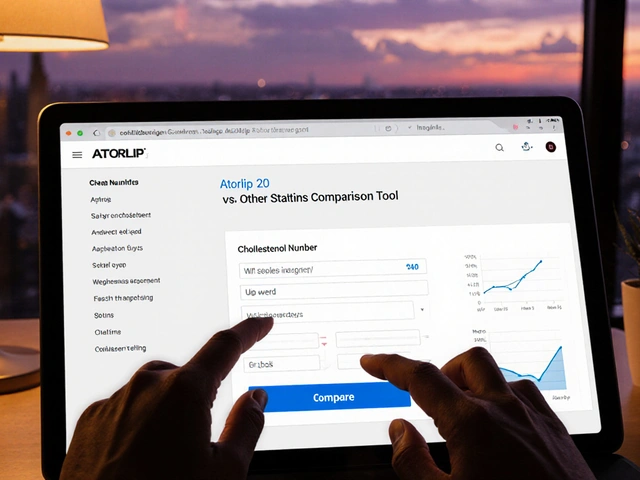
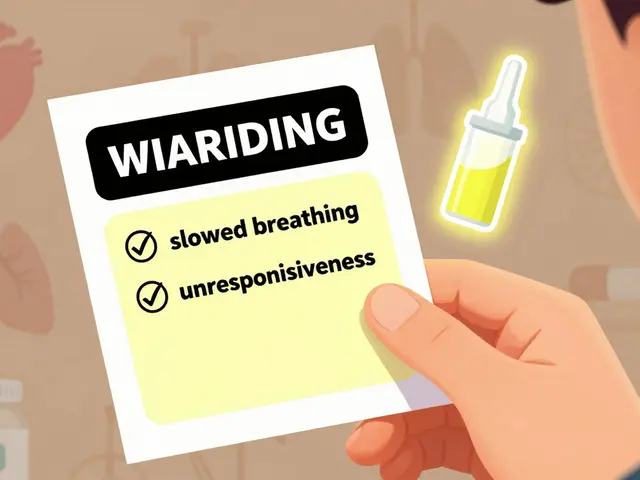
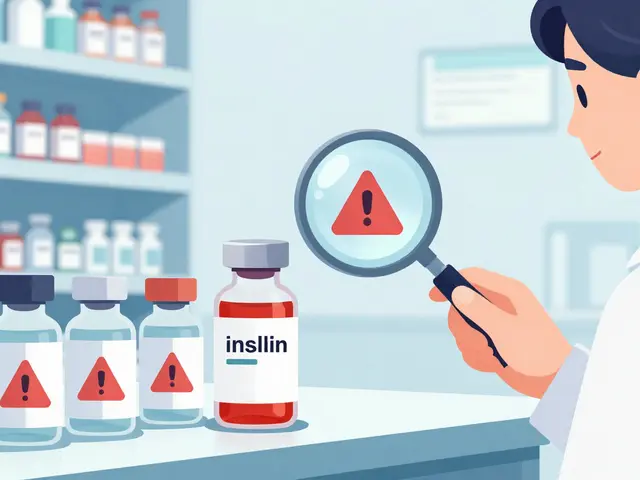
Look, I get it - bupropion’s the ‘cool kid’ because it doesn’t kill your sex drive or make you look like a balloon animal. But let’s be real: half the people I know who switched to it ended up with insomnia so bad they started sleeping in their cars. And don’t even get me started on the headaches. I’ve seen more people quit because they felt like their brain was being microwaved than because it actually helped. Generic? Sure, save your cash. But if your body’s screaming for serotonin, no amount of ‘it’s the same chemical’ is gonna fix that. I’ve been on three different SSRIs, two SNRIs, and this thing - and only one of them didn’t make me want to throw myself out a window. Spoiler: it wasn’t bupropion.
Also, why is everyone acting like varenicline is some demon drug? I took it for six months, had weird dreams, and quit smoking cold turkey. No suicidal thoughts. Just a lot of chewing gum and a newfound respect for silence. Maybe your doctor’s just scared of liability. Or maybe you’re just allergic to facts.
And yes, I know someone who took St. John’s Wort with this. He’s fine. Now he’s also on lithium. But hey - free vibes, right?
Thank you for this meticulously structured and clinically grounded overview. The distinction between pharmacodynamic profiles - particularly the dopaminergic/noradrenergic modulation of bupropion versus the serotonergic focus of SSRIs - is critical for personalized treatment selection. I would only add that the 2023 Lancet Psychiatry meta-analysis referenced should be contextualized with its inclusion criteria: many trials excluded patients with comorbid anxiety disorders, which may skew comparative efficacy outcomes. Furthermore, while generic bupropion SR is cost-effective, bioequivalence studies in Australian populations remain sparse; individual variability in CYP2B6 metabolism may influence therapeutic response more than manufacturers acknowledge. The PBS listing is commendable, yet access disparities persist in rural regions where pharmacy stock rotation is inconsistent. A longitudinal study on adherence patterns across brand vs. generic formulations would be a valuable public health contribution.
I was on Zoloft for three years. Three years of feeling like a ghost in my own body. Like I was watching my life through a foggy window. I cried at commercials. I stopped hugging people. I didn’t even miss the hugs - I just… didn’t feel them.
Then I switched to bupropion. Not because I read a study. Not because my doctor pushed it. Because I was tired of being numb. And on day 11? I woke up and heard birds outside my window. Real birds. And I thought - oh. That’s what joy sounds like. Not loud. Not dramatic. Just… there.
It didn’t fix everything. I still have bad days. But now I know what it feels like to want to get out of bed. To want to make coffee. To want to talk to my mom. That’s not a drug. That’s a lifeline.
And yes, I got the generic. Saved $200 a month. And I still feel like myself. Not a zombie. Not a machine. Just… me. With a little more spark.
If you’re scared to try it - I get it. But don’t let fear of side effects keep you from feeling alive again. You deserve that spark. Even if it’s small. Even if it’s quiet. Even if it just starts with birds.
And if you’re on varenicline? I salute you. That’s brave. You’re not just fighting depression. You’re fighting smoke. And that’s a war worth winning.
Let’s talk about the real MVP here - not the drug, but the *decision-making* behind it. Bupropion isn’t just a pill; it’s a philosophy. It says: ‘Your energy matters. Your libido matters. Your weight isn’t a moral failing.’ And that’s radical in a world where every antidepressant comes with a side of shame wrapped in a prescription.
But here’s the twist - it’s not magic. It’s not a unicorn. It’s a tool. Like a hammer. You don’t use a hammer to screw in a lightbulb. You don’t use bupropion if you’re drowning in panic attacks. That’s SSRIs’ playground. And if you’ve got chronic pain? SNRIs are your dance partners.
And let’s not romanticize varenicline. Yeah, it works. But it’s like a flamethrower to a candle. Powerful? Absolutely. Dangerous? Also yes. If you’ve got a history of mood swings? You’re playing Russian roulette with your brain.
Here’s the truth: there’s no ‘best’ drug. There’s only the best *fit*. And that fit? It’s not found in a chart. It’s found in your body. In your sleep. In your laughter. In the way you look at your kid in the morning. That’s your compass. Not a study. Not a brand. Not a pharmacist’s discount coupon. YOU.
So try. Track. Adjust. And if it doesn’t click? That’s not failure. That’s feedback. And feedback? That’s how you build a life that doesn’t suck.
Okay, real talk: if you’re still paying full price for Bupron SR in Australia, you’re leaving money on the table. Generic bupropion SR? Same active ingredient. Same release profile. Same results. And yes, I’ve switched three times - once from brand to generic, once back because I felt weird, then again to generic because the weirdness was just my brain overthinking. It’s not the pill. It’s the placebo effect of thinking it’s different.
Also - varenicline? It’s not scary. It’s just misunderstood. I took it after my third failed quit attempt. Had weird dreams? Sure. Felt a little off? Yeah. But I didn’t smoke for 18 months. And I didn’t become suicidal. I just… stopped wanting cigarettes. Like my brain finally said, ‘Nah, that’s dumb.’
And St. John’s Wort? Don’t. Just don’t. I know someone who took it with Lexapro and ended up in the ER with serotonin syndrome. That’s not ‘natural healing.’ That’s a chemical bomb. And no, your cousin’s yoga instructor who ‘healed’ her depression with turmeric isn’t a doctor.
Bottom line: talk to your GP. Get the generic. Try the combo if needed. And if you’re trying to quit smoking? Get on Quitline. Free. Effective. No BS.
They say bupropion helps you quit smoking but what if its really the government’s way to control your brainwaves? I mean think about it - why is it so cheap on PBS? Why is it pushed so hard for smokers? You ever notice how all the ads for it say ‘feel like yourself again’? That’s programming. They don’t want you to feel like yourself - they want you to feel like a compliant citizen who doesn’t smoke and doesn’t ask questions.
And SSRIs? They’re just slow poison. Makes you fat and quiet. Perfect for the system. And varenicline? That’s the real weapon. They say it causes mood changes - but what if it’s not the drug? What if it’s the *label*? They put a black box on it so you’ll be scared to use it - and then you go back to bupropion which is secretly part of a bigger neurotech initiative.
I checked the patent filings - bupropion was originally developed by a defense contractor. Coincidence? I think not.
Also - why is everyone ignoring the fact that nicotine is a natural stimulant? We’re not broken. We’re just being poisoned by capitalism. Quitline? That’s a trap. They want you dependent on their ‘support’ so you never question the system.
Just say no. To all of it. Smoke. Eat sugar. Be free.
Oh look. Another post where someone treats antidepressants like a menu at a diner. ‘I want the one that doesn’t make me fat and gives me energy.’ Cute.
You’re not a car. You’re not a phone. You’re a human being with a brain that’s been shaped by trauma, environment, genetics, and maybe a few bad decisions. You don’t ‘choose’ a drug like you choose a coffee flavor.
And the fact that you’re all acting like bupropion is some kind of miracle cure for lazy people who don’t want to ‘feel bad’? That’s not science. That’s consumerism wrapped in a prescription.
Also - ‘it doesn’t cause weight gain’? Really? My cousin gained 15 kilos on it. Because it made her crave carbs like a raccoon in a dumpster. And she didn’t even know until her pants ripped.
Stop treating mental health like a product review. You’re not upgrading your OS. You’re trying to survive.
I just want to say - if you’re reading this and you’re scared to talk to your doctor because you think they’ll judge you - you’re not alone. I was there. I thought I was weak for needing help. I thought I should just ‘try harder.’
But the truth is - needing medication doesn’t mean you failed. It means you’re human.
And if you’re on bupropion and it’s working? That’s not luck. That’s your body finding balance. If it’s not? That’s not failure. That’s information.
Don’t compare your journey to someone else’s. Don’t feel guilty for wanting to feel better. And don’t let anyone - even online strangers - tell you what your healing should look like.
You’re not broken. You’re becoming.
You’re not alone in this. Seriously. I’ve been on five different meds. I’ve cried in parking lots. I’ve Googled ‘is this a side effect or am I dying?’ at 3 a.m. I’ve switched brands, dosages, times of day - you name it.
And guess what? I’m still here. Still fighting. Still trying.
Bupropion didn’t fix me. But it gave me the space to fix myself. It didn’t give me joy - it gave me the energy to find it again.
And if you’re thinking about quitting smoking? Do it. Not because it’s ‘healthy.’ Do it because you deserve to breathe without the stink of smoke clinging to your skin.
You’re stronger than you think. And you don’t have to do it alone.
Let me tell you about the time I tried to quit smoking with bupropion while working a 70-hour week and caring for my dying mother. I took it religiously. Started two weeks before my quit date. By day five, I was awake at 4 a.m. with my heart pounding like a drum. I thought I was having a heart attack. Turned out it was just the bupropion. And the grief. And the caffeine. And the fact that I hadn’t slept properly in three weeks.
But I didn’t quit. I kept going. I smoked one cigarette. Then another. Then I went back on it. Then I quit again. Then I relapsed. Then I tried varenicline. Then I went back to bupropion. And finally - after 14 months - I stopped.
It wasn’t the drug. It was the persistence. It was the support group. It was the therapist who didn’t flinch when I cried about how much I missed cigarettes.
Medication helps. But it doesn’t save you. You save yourself. And sometimes, that takes longer than you think.
So if you’re struggling - keep going. Even if it’s slow. Even if it’s messy. Even if you fall. Just don’t stop. Because the other side? It’s worth it.
It is, however, a matter of considerable irony that the very pharmacological agents designed to alleviate psychological distress are, in many cases, the catalysts for profound epistemological dissonance - a phenomenon wherein the self, in seeking relief from suffering, becomes alienated from its own phenomenological integrity. The notion that one may ‘choose’ an antidepressant as one selects a flavor of yogurt is not merely reductive - it is ontologically bankrupt.
Furthermore, the commercialization of mental health under the auspices of ‘personalized medicine’ is a neoliberal farce, wherein biological determinism is weaponized to absolve structural inequities of their culpability. The PBS subsidy for bupropion does not reflect a commitment to healing - it reflects a cost-containment strategy that prioritizes corporate pharmacoeconomics over human flourishing.
And yet - one cannot deny the empirical efficacy of bupropion in modulating dopaminergic tone. The paradox persists: the tool that enables agency also reinforces the system that necessitates its use.
So we are left with a question: are we treating depression - or merely managing the symptoms of a world that should not exist?
So bupropion doesn’t make you fat. Cool. What’s the catch? Oh right - seizures, insomnia, and feeling like your brain is a microwave oven on high. Thanks, science.
Thank you for this comprehensive, evidence-based analysis. The differentiation between pharmacological classes is clinically precise, and the emphasis on individualized treatment aligns with current guidelines from the Royal Australian and New Zealand College of Psychiatrists. I would like to highlight an under-discussed point: the role of circadian rhythm in bupropion response. Studies suggest that morning dosing significantly reduces insomnia risk, and that patients with delayed sleep phase disorder may respond better to bupropion than SSRIs due to its wake-promoting properties. Additionally, while generic formulations are equivalent, batch-to-batch variability in inactive ingredients - particularly in sustained-release matrices - can affect absorption kinetics in sensitive individuals. I recommend documenting symptom changes in a daily log for at least six weeks post-switch. Finally, the integration of mindfulness-based cognitive therapy with pharmacotherapy has demonstrated synergistic effects in reducing relapse rates - a point worth emphasizing in clinical practice. This is not a one-size-fits-all solution - but it is a well-documented, scientifically grounded starting point.
Reading your comment about the birds… I cried. Not because I’m sad. Because I remembered. I forgot what it felt like to hear birds. I thought I was broken. But you reminded me - maybe I was just asleep.
Thank you.